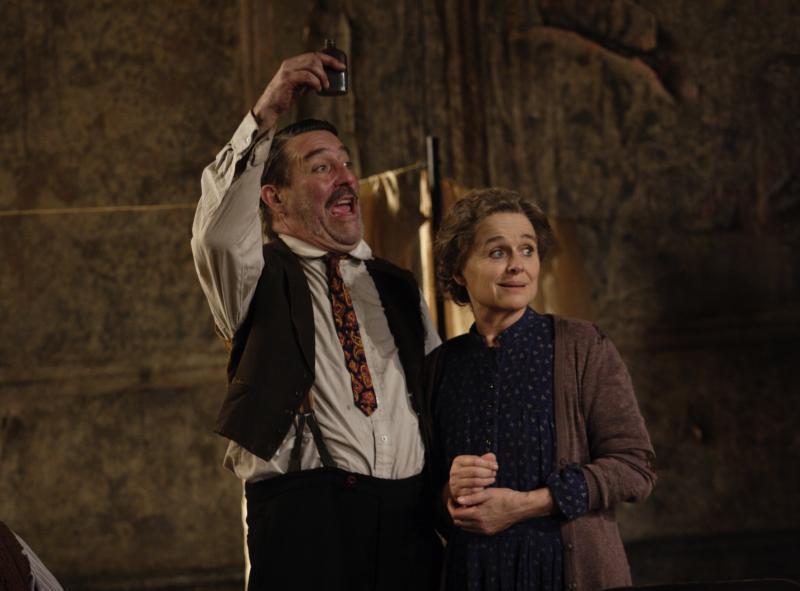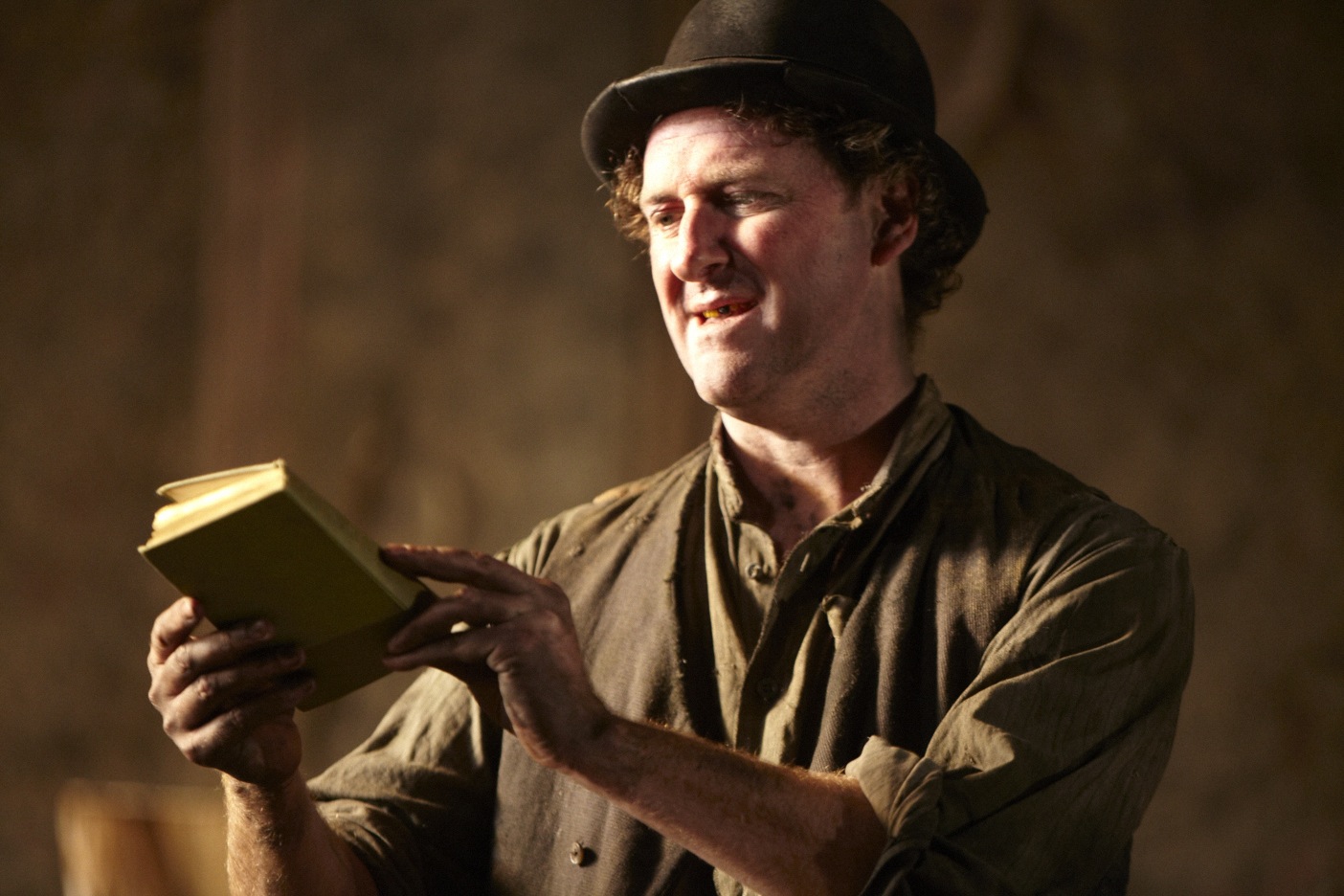Juno and the Paycock, National Theatre | reviews, news & interviews
Juno and the Paycock, National Theatre
Juno and the Paycock, National Theatre
Howard Davies's clear-eyed production of O'Casey masterpiece

“The whole world's in a terrible state of chassis,” says Captain Jack Boyle more than once during Sean O'Casey's great play, set in 1922 and the second of his Dublin trilogy, bookended by The Shadow of a Gunman (1923) and The Plough and the Stars (1926).
But you don't have to know any Irish history to enjoy Howard Davies's clear-eyed (if not always emotionally engaging) production (a co-production with the Abbey), for this is a drama as much about the disintegration of a family as it is about a nation at war with itself. And as Ireland today finds itself in another “state of chassis”, the play suddenly has some striking resonances, as the characters, whether they be “Staters” (supporters of the Free State) or “Die Hards” (opponents of the Treaty), or indeed the majority who didn't take up arms for either side, all feel let down by their leaders. Plus ça change...
We are in a decrepit Dublin tenement, where the members of the Boyle household can each be seen to represent an Irish stereotype. Captain Jack Boyle is the prolix dreamer, Juno the put-upon wife and mother, Mary, the daughter bettering herself through a love of literature, and Johnny the battle-damaged son. Joxer, meanwhile, the Captain's drinking pal, is the feckless drinker and chancer.
 The Captain (Ciarán Hinds), so-called because he once served briefly in the merchant navy, wears a nautical cap and tells tall tales of his mariner days, is, as ever, avoiding work. His daughter Mary (Clare Dunne) is on strike, while his son Johnny (Ronan Raftery) was terribly injured when fighting for the Die Hards. Juno (Sinéad Cusack) is the only Boyle bringing in a wage, fighting to keep the family's heads above water and her husband away from his ne'er-do-well “butty” Joxer.
The Captain (Ciarán Hinds), so-called because he once served briefly in the merchant navy, wears a nautical cap and tells tall tales of his mariner days, is, as ever, avoiding work. His daughter Mary (Clare Dunne) is on strike, while his son Johnny (Ronan Raftery) was terribly injured when fighting for the Die Hards. Juno (Sinéad Cusack) is the only Boyle bringing in a wage, fighting to keep the family's heads above water and her husband away from his ne'er-do-well “butty” Joxer.
Then the very smart solicitor Mr Bentham (Nick Lee) turns up and tells Jack that he has inherited a large sum of money from a long-lost cousin. What should be their salvation becomes the Boyles' ruin, as they run up huge debts on the strength of their expectation, and the smoothly ambitious Benthall seduces Mary.
As the second half opens, Bob Crowley's magnificent set (almost a companion piece to Rae Smith's for The Veil in the same space) is now bedecked with curtains and tablecloths, and some fine furniture (all paid for on tick), but the peeling walls and pockmarked windows remain, as if to presage the downfall that awaits the Boyles. For Benthall, who drew up the Captain's cousin's will, didn't record it properly and there will be no inheritance. And then we learn that Mary is pregnant by him after he has fled to England, and Johnny is being hunted by militia who suspect him of causing a comrade's death. It all ends in tragedy, of course.
But, this being O'Casey, a vivid and compassionate writer, there is great humour among the pathos, much of it in the verbal sparring between Juno and her husband, a lot of talk about “cups of tay” and Janet Moran's excellent turn as the neighbour Mrs Madigan, who latches on to Jack when he comes into money but is just another chancer when it's revealed he is poorer than she is. Risteárd Cooper as Joxer (pictured above by Mark Douet), meanwhile, threatens to steal every scene he's in with some mighty fine drunk acting (often a thankless task for an actor).
Hinds has a playful swagger as Jack (he's the peacock of the title after all), but it's Cusack who shines with a beautifully measured performance of a woman who refuses to be cowed by her circumstances. Her delivery of the line, "It's nearly time we had a little less respect for the dead, an' a little more regard for the living” haunts us as we know she will shortly be a grieving mother herself, in a land that for much of its history has worshipped deeply flawed heroes.
- Juno and the Paycock is at the National Theatre, London SE1 until 26 February, 2012
rating
Buy
Share this article
The future of Arts Journalism
You can stop theartsdesk.com closing!
We urgently need financing to survive. Our fundraising drive has thus far raised £49,000 but we need to reach £100,000 or we will be forced to close. Please contribute here: https://gofund.me/c3f6033d
And if you can forward this information to anyone who might assist, we’d be grateful.

Subscribe to theartsdesk.com
Thank you for continuing to read our work on theartsdesk.com. For unlimited access to every article in its entirety, including our archive of more than 15,000 pieces, we're asking for £5 per month or £40 per year. We feel it's a very good deal, and hope you do too.
To take a subscription now simply click here.
And if you're looking for that extra gift for a friend or family member, why not treat them to a theartsdesk.com gift subscription?
more Theatre
 Ragdoll, Jermyn Street Theatre review - compelling and emotionally truthful
Katherine Moar returns with a Patty Hearst-inspired follow up to her debut hit 'Farm Hall'
Ragdoll, Jermyn Street Theatre review - compelling and emotionally truthful
Katherine Moar returns with a Patty Hearst-inspired follow up to her debut hit 'Farm Hall'
 Troilus and Cressida, Globe Theatre review - a 'problem play' with added problems
Raucous and carnivalesque, but also ugly and incomprehensible
Troilus and Cressida, Globe Theatre review - a 'problem play' with added problems
Raucous and carnivalesque, but also ugly and incomprehensible
 Clarkston, Trafalgar Theatre review - two lads on a road to nowhere
Netflix star, Joe Locke, is the selling point of a production that needs one
Clarkston, Trafalgar Theatre review - two lads on a road to nowhere
Netflix star, Joe Locke, is the selling point of a production that needs one
 Ghost Stories, Peacock Theatre review - spirited staging but short on scares
Impressive spectacle saves an ageing show in an unsuitable venue
Ghost Stories, Peacock Theatre review - spirited staging but short on scares
Impressive spectacle saves an ageing show in an unsuitable venue
 Hamlet, National Theatre review - turning tragedy to comedy is no joke
Hiran Abeyeskera’s childlike prince falls flat in a mixed production
Hamlet, National Theatre review - turning tragedy to comedy is no joke
Hiran Abeyeskera’s childlike prince falls flat in a mixed production
 Rohtko, Barbican review - postmodern meditation on fake and authentic art is less than the sum of its parts
Łukasz Twarkowski's production dazzles without illuminating
Rohtko, Barbican review - postmodern meditation on fake and authentic art is less than the sum of its parts
Łukasz Twarkowski's production dazzles without illuminating
 Lee, Park Theatre review - Lee Krasner looks back on her life as an artist
Informative and interesting, the play's format limits its potential
Lee, Park Theatre review - Lee Krasner looks back on her life as an artist
Informative and interesting, the play's format limits its potential
 Measure for Measure, RSC, Stratford review - 'problem play' has no problem with relevance
Shakespeare, in this adaptation, is at his most perceptive
Measure for Measure, RSC, Stratford review - 'problem play' has no problem with relevance
Shakespeare, in this adaptation, is at his most perceptive
 The Importance of Being Earnest, Noël Coward Theatre review - dazzling and delightful queer fest
West End transfer of National Theatre hit stars Stephen Fry and Olly Alexander
The Importance of Being Earnest, Noël Coward Theatre review - dazzling and delightful queer fest
West End transfer of National Theatre hit stars Stephen Fry and Olly Alexander
 Get Down Tonight, Charing Cross Theatre review - glitz and hits from the 70s
If you love the songs of KC and the Sunshine Band, Please Do Go!
Get Down Tonight, Charing Cross Theatre review - glitz and hits from the 70s
If you love the songs of KC and the Sunshine Band, Please Do Go!
 Punch, Apollo Theatre review - powerful play about the strength of redemption
James Graham's play transfixes the audience at every stage
Punch, Apollo Theatre review - powerful play about the strength of redemption
James Graham's play transfixes the audience at every stage
 The Billionaire Inside Your Head, Hampstead Theatre review - a map of a man with OCD
Will Lord's promising debut burdens a fine cast with too much dialogue
The Billionaire Inside Your Head, Hampstead Theatre review - a map of a man with OCD
Will Lord's promising debut burdens a fine cast with too much dialogue

Add comment